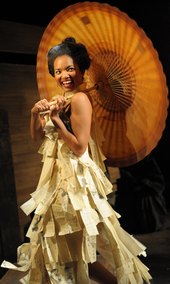SITE GUIDE
SEARCH
REVIEWS
REVIEW ARCHIVES
ADVERTISING AT CURTAINUP
FEATURES
NEWS
Etcetera and
Short Term Listings
LISTINGS
Broadway
Off-Broadway
NYC Restaurants
BOOKS and CDs
OTHER PLACES
Berkshires
London
California
New Jersey
DC
Philadelphia
Elsewhere
QUOTES
TKTS
PLAYWRIGHTS' ALBUMS
LETTERS TO EDITOR
FILM
LINKS
MISCELLANEOUS
Free Updates
Masthead
Writing for Us
A CurtainUp  London Review
London Review
 London Review
London ReviewTurandot
|
What was the answer you gave when you got it wrong?— Krukher Kru
25. Which would apparently been spot on if the question had been 5x5 and not 5x3.— Gogher Gogh |

Chipo Chung as Princess Turandot
(Photo: Robert Day) |
Turandot was Bertolt Brecht's last and unfinished play and he believed that theatre should be fun as well as educational. Edward Kemp has written a new version for Anthony Clark to direct this eye catching production at Hampstead Theatre. Brecht based his story, subtitled, Or The Congress of Whitewashers, more on Carlo Gozzi's commedia dell'arte version of the story of Princess Turandot than the Schiller which forms the basis for Puccini's opera. What is remarkable is that though it is often shown in Continental Europe, this is the first ever production of this play in Britain.
Although a Brecht play set in Imperial China, like The Good Person of Schezuan staged at the Young Vic earlier this year, Turandot has none of the polemic. The Emperor of China (Gerard Murphy) advised by his Prime Minister (Jamie Newall) has invested in cotton and the plentiful harvest has made the crop worthless because supply exceeds demand. The Emperor's solution is to hide the cotton in his warehouses and so stimulate the market. When the question is asked, "Where has all the cotton gone?" a body of intellectuals, here called the Telius, are invited to answer it on behalf of the Emperor. The prize offered for the best answer is the hand of the pretty but daft Princess Turandot (Chipo Chung)— but beware —those who do not succeed are sentenced to death!
In the market places, thought has become a marketable commodity as stalls of Telius sell opinions, excuses and ideas for those who can pay. A local gangster Gogher Gogh (Alex Hassell) wants to become a Teliu because he says he feels "destined for public service" and realises that marrying into the Imperial Family would be a good career move for a gangster! The final scene sees a lot of little red books onstage as the director reminds us of the Maoist future of China and strikes a serious note as we remember the Cultural Revolution and the sentencing of intellectuals to work in the fields.
Garance Marneur's designs are colourful, ambitious and delightfully Eastern. The set has plenty of bamboo detail, Chinese motifs and huge bales of cotton are dragged onstage by downtrodden peasants. The Emperor opens the play wearing white silk, shortie pyjamas and a red headdress which looks like a tomato coloured cross between a food cover and a tea pot and the seductively ditsy princess shows us her big cotton knickers under her mini red silk cheongsam every time she's excited by someone who has a few brain cells, which is pretty often. The Telius wear long silken ears in the style of Fu Man Chu and everyone from the palace classes is kitted out in glorious brocades.
Gerard Murphy's volatile and capricious Emperor is a delight as is Chipo Chung as his scatty but sexily aroused daughter. Hi Weh Chairman of the Telius is played by Mia Soteriou who has also composed some of the songs and the music is divertingly integrated into the play. A super smooth Alex Hassell in white suit as the gangster catches the Princess's eye. Michael Mears is both a lofty Teliu and Yao Yel the Emperor's haughty brother. The ensemble cast work hard to create many characters from mandarins to peasants and Antony Clark's direction keeps the action moving apace. He has taken a quote from Brecht for inspiration, "A theatre that cannot be laughed in is a theatre to laugh at. Humourless people are ridiculous."
|
Turandot
Written by Bertolt Brecht in a new version by Edward Kemp directed by Anthony Clark Starring: Gerrard Murphy, Chipo Chung, Alex Hassell, Mia Soteriou, Michael Mears With: Jamie Newall, David Yip, Daniel York, Julie Jupp, Gemma Chan, Col Farrell, Thomas Bailey/Tina Luo Composer: Mia Soteriou Design: Garance Marneur Lighting: James Farncombe Sound: Steven Brown Musical Director: Mia Soteriou Stage Design supported by The Linbury Trust Running time: Two hours 45 minutes with one interval Box Office: 020 7722 9301 Booking at Hampstead Theatre to 4th October 2008 Reviewed by Lizzie Loveridge based on 8th September 2008 at Hampstead Theatre, Eton Avenue, London NW3 (Tube: Swiss Cottage) |
|
REVIEW FEEDBACK Highlight one of the responses below and click "copy" or"CTRL+C"
Paste the highlighted text into the subject line (CTRL+ V): Feel free to add detailed comments in the body of the email and state if you'd like your comments published in our letters section. |
|
London Theatre Tickets Lion King Tickets Billy Elliot Tickets Mighty Boosh Tickets Mamma Mia Tickets We Will Rock You Tickets Theatre Tickets |




